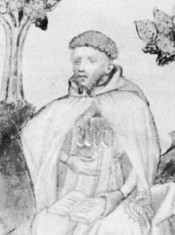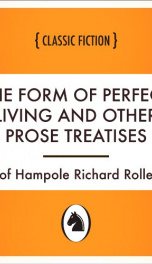Rolle Richard of Hampole

Christianity Portal Richard Rolle (1290–1349) was an English religious writer, Bible translator, and hermit.[1] He is known as Richard Rolle of Hampole or de Hampole, since after years of wandering he settled in Hampole, near the Cistercian nunnery. Born into a small farming family[2] and brought up near Pickering, he studied at the University of Oxford, where he was accompanied by his patron Thomas de Neville, the Archdeacon of Durham.[3] He showed little interest in the scholastic disputations of the time, displaying a devotion to study of the Scripture; he also learnt Latin during his time there.[4] Rolle left Oxford at age eighteen or nineteen. Fearing he had ceded too greatly to temptation in his youth, and that he would transgress further, he adopted the life of a hermit shortly afterwards. He had his cell first at Pickering, and then in the North Yorkshire parish of Ainderby. Rolle, guided by his conscience, was often misunderstood and repelled by others. He briefly housed with a squire, John Dalton, whose wife disapproved of him, and he found no more favour with the bishop or monks, having to frequently change abode. The laity were cautious of him, and he found it difficult to approach women, who thought ill of his intentions.[5] Two years and eight months after becoming a hermit, Rolle had his first mystical experience. Around a year later, he felt similarly after listening to a choir, and he began to take less interest in all things temporal.[6] Rolle then made his way to Sorbonne, which specialised at the time in Bibilical exegesis and pastoral theology, feeling that his attendance at the university was not inconsistent with his lifestyle. In fact, Rolle's time in Paris proved to be of great value in his life, much of which was taken up by contemplation, as he acquired an adeptness in theology.[7] On the contemplative life, he wrote, "There are many active men better than some contemplatives", though, "the best contemplatives are better than the best actives".[8] Rolle may have been ordained as a priest in his time at Sorbonne. In the years after, he spent much of his time on the moors of Richmondshire, exposing himself to a harsh climate, and in the process strengthening his communion with God and his discipline in his conduct.[9] Although he was still met with hostility from the clergy, and he conceded that he was awkward with men, he became acquainted with some parish priests, and William Stokes, a Doctor of Divinity, during this time.[10] Rolle was wary of his relationships with women as well, although he found greater success with them, especially in the last nine years of his life, when he inhabited a cell near the Cisterian nunnery of Hampole. Because of his time spent here, where he was director of the inmates, he is sometimes known as Richard Rolle of Hampole, or de Hampole. He wrote The Form of Living and his English Psalter for a nun there, Margaret Kirkby (who later took up a similar life to Rolle, as an anchoress), and Ego Dormio for a nun at Yedingham.[11] Rolle died in 1349, the first year that the Black Death came to England, and it may have been the cause of his death.[12][2] He wrote in both Latin and English (his first work, Melum, was of alliterative Latin); many works are attributed to him, but it has been questioned how many are genuinely from his hand. In particular, The Pricke of Conscience, once attributed to him, is now thought to have been written by an anonymous author in the 14th century.[2] Some of his writings were printed in the sixteenth century, by Wynkyn de Worde. In one of his best-known works, The Fire of Love, Rolle provides an account of his mystical experiences, which he describes as being of three kinds: a physical warmth in his body, a sense of wonderful sweetness, and a heavenly music that accompanied him as he chanted the Psalms. The book was widely read in the Middle Ages, and described the four purgative stages that one had to go through to become closer to God: described as open door, heat, song, and sweetness. Because of the wide proliferation of his works, there was a movement to have him canonized.[2][3] As many of his works were concerned with personal devotion, some, with considerable alterations, were used by the Lollards.[3] He was regarded as a saint after his death; but he was never canonized. He is remembered in the Church of England with a Commemoration on 20 January.
do you like this author?
What readers are saying
What do you think? Write your own comment on this book!
write a commentWhat readers are saying
What do you think? Write your own comment on this author!
write a commentBook list

The Form of Perfect Living and Other Prose Treatises
Series:
Unknown
Year:
Unknown
Raiting:
4/5
This book was converted from its physical edition to the digital format by a community of volunteers. You may find it for free on the web. Purchase of the Kindle edition includes wireless delivery.
Show more
add to favoritesadd In favorites
Book list

The Form of Perfect Living and Other Prose Treatises
Series:
Unknown
Year:
Unknown
Raiting:
4/5
This book was converted from its physical edition to the digital format by a community of volunteers. You may find it for free on the web. Purchase of the Kindle edition includes wireless delivery.
Show more
add to favoritesadd In favorites
What readers are saying
What do you think? Write your own comment on this author!
write a commentif you like Rolle Richard of Hampole try:
readers also enjoyed
What readers are saying
What do you think? Write your own comment on this author!
write a commentif you like Rolle Richard of Hampole try:
readers also enjoyed
Do you want to exchange books? It’s EASY!
Get registered and find other users who want to give their favourite books to good hands!

